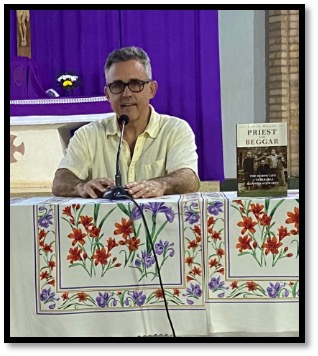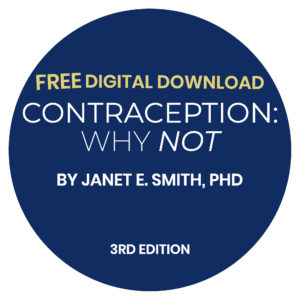Addressing Homosexuality in Uganda (Pt. 3)
Is homosexuality creeping into Africa through the Western push for recognition of the “rights” of homosexuals?
This article was originally published in Crisis Magazine.
As I stated in previous columns, Ugandans don’t have much experience of homosexuality. What there is of it in their culture is largely unseen. One of my challenges was to help them understand the phenomenon of homosexuality and why a compassionate response is warranted. My lifetime work on contraception has led me to look closely at other sexual sins, such as homosexuality.

I have read countless books on the subject and have also learned a great deal from close friendships with men who experience same-sex attractions. These men want to live chaste lives but find the challenge nearly impossible—until they turn their lives over to Christ. In order to illustrate the causes of homosexuality and the trials faced by those attempting to live chaste lives, I told the real-life stories of several homosexual men: Paul Darrow, Hudson Byblow, Dan Mattson, Andy Comiskey, and Ken Williams.
In their stories and the stories of others, and in conversations with friends who struggle with same-sex attraction, I found this to be a typical pattern in their lives:
- Something happens (such as sexual abuse, paternal neglect, exposure to homosexual pornography) that corrupts a man’s makeup.
- That corruption leads to unwanted, unchosen same-sex desires.
- These desires seem ineradicable.
- Those with same-sex attraction fear chastity will lead to a life of loneliness and believe only other gays will accept them.
- Because homosexuals feel helpless against their desires, they are filled with self-hatred and despair, sometimes to the point of contemplating suicide.
- Most of them have at least a period in their lives where they are wildly promiscuous and, over time, can have hundreds of partners, some anonymous.
- Nonetheless, some date in pursuit of romance and “love”; they will sometimes find someone with whom to settle down and “marry,” though very few, if any, of those relationships are faithful. Nor is fidelity really required; being sexually with others is tolerated and even expected as long as there is no emotional commitment with another man.
- Natural means, such as counseling, give them some insight into the sources of their desires and provide some relief but do not equip them to control their desires.
- Most homosexuals know “deep down” that homosexual sexual acts are wrong.
- They think God hates them because He let them become homosexual and that He also hates them for the depraved actions they have performed.
For those who repent and want to follow the Gospel:
- Things begin to change when they realize the God of Scripture loves them and wants to help them.
- They seek help from others: counselors, ministers and priests, for instance.
- They dedicate their lives to pursuing intimacy with Jesus (for Catholics, daily Mass, daily Rosary, regular confession, spiritual reading, etc.) and service to others.
- They find profound happiness in serving others.
The seminarians received all of this with wide-eyed amazement. Quite a few had trouble thinking homosexuals deserve any compassion at all since they engage in acts that are an abomination. I pointed out that while it is true that homosexual acts are more unnatural than such sins as fornication, fornication has much more harmful effects in bringing children into the world who don’t have fathers and in leaving women to raise children on their own.
From some, I received enthusiastic agreement and from others, begrudging agreement. Again, I am not sure they understand the importance of fathers for the well-being of a child and the justice needed toward the mother of the child, which, of course, is all too true of too many in our culture.
I told them of the work of Courage and other outreaches to homosexuals, and I also challenged them to come up with programs suitable to the Ugandan culture. It would be a challenge to teach that homosexual acts are immoral while, at the same time, provide compassionate care to homosexuals without conveying approval. They will need to find ways to warn young men against predators, help parents love their homosexual children, and help find ways to combat the agenda of the pro-LGBTQ+ NGOs, among other challenges.
I delighted in telling them about something that happened before they were born regarding the HIV crisis in the 1990s. No country has had greater success than Uganda in stemming the spread of HIV with its program “ABC”: Abstinence, Be Faithful (to your spouse or partner), and use condoms if necessary. I told them few in the West knew of Uganda’s success because it conflicts with the Western view that African men can’t control themselves sexually—and it doesn’t make any money for pharmaceutical companies.

They had lots of questions after my talks, such as “Why do Americans care what Africans think about homosexuality?”; “What should a Catholic do when the pope seems to be teaching something that is not compatible with Church doctrine?”; “Won’t compassion toward homosexuals be interpreted as acceptance and thus an opening for acceptance of homosexuality?”; “Do you really think Africa can help the worldwide Church? How?”; “In what way does the U.S. government promote homosexuality?”; “How did Americans come to accept homosexuality?”; “How is that acceptance being countered?”; “Can the ministry of exorcisms and healing be of help to homosexuals?”; “What has Pope Francis done to fellow Jesuits who promote homosexuality?”; “Don’t some men engage in homosexual acts just for the money?”; “How should we deal with the threat of Western organizations and states that unless Ugandans accept homosexuality, no aid will be given?”
Only one student submitted a question that indicated an openness to accepting homosexuality: “As future religious leaders, how can we reconcile our beliefs and teachings with the lived experiences and identities of LGBTQI individuals?”
I left them with questions:
- How can the Church help young boys who have been abused? Who have been paid to have sex?
- How can the Church help parents love their homosexual children, both young and as adults?
- What would happen if boys were told to report any abuse or attempted abuse to legal authorities? Should that be encouraged?
- Should boys and young men at least be warned against the possibility of older men preying upon them?
- What can and should be the Church’s role in combating predators, some or many, it seems, associated with the LGBTQ+ advocates in Uganda?
- What should the Church do with respect to priests who engage in homosexual acts, with children, with minors, the vulnerable, or with seminarians?

At the end of one of my visits, a seminarian presented me with a book he has written about homosexuality wherein he makes the charges I repeatedly heard—that homosexuality is creeping into Uganda through the Western push for recognition of the “rights” of homosexuals, which is tied to funding and the predation of children. Note the graphic description in the blurb that shows that when Ugandans speak about “delicate” issues, they speak plainly!
My talks were followed by a rousing and inspiring talk by Kevin Wells, author of The Priests We Need to Save the Church and Priest and Beggar. Kevin tells great stories of priests who have laid down their lives for others, and he challenged the seminarians to become soldiers for Christ. He will be sharing some of his stories about his travels in Africa in columns in Crisis.
The bishops and priests of Uganda are intent upon providing the men with the best education they can—in spite of very limited funds and resources. They have no textbooks, and there are very few books in the library. (I will be heading up a campaign to collect books for Ugandan seminaries.)
In order to help men discern whether or not they have a true vocation to the priesthood and to prepare for the priesthood, the bishops are instituting a propaedeutic year that will be instituted this summer. Many U.S. seminarians have such a year prior to official entry into seminary that serves to help the men “detox” from social media, electronics, and the multitude of distractions characteristic of modern life.
In Uganda, the purpose is somewhat different. Due to the poverty in Uganda, many men enter seminary to escape a life of poverty. The seminary formators are, of course, acutely aware of this reality and labor to take those who come to them and turn their vocations into genuine ones. As I perused the manual for the propaedeutic year, I was very impressed with how practical and specific its counsel is. Given the high status the priesthood has among Ugandan Catholics, advice like this is apt:
When the seminarian returns to his home, the family should continue teaching him how to work and manage home affairs in collaboration with the rest of the siblings. The seminarian should not be given preferential treatment but should be treated as a child in the family under formation like the others. (146)
There was also a mention of homosexuality that indicates the growing awareness of it as a threat:
Seminarians…who practice homosexuality, or present deep-seated homosexual tendencies or support the so-called “gay culture” should not be allowed to continue with seminary formation and cannot be admitted to Holy Orders. While such persons are profoundly respected, the Catholic Church in Uganda remains consistently faithful to the teaching of the Magisterium and our African social-culture view, corroborated by the current legislation of our country on this matter, an advantage which should not be taken for granted. (186)

Fr. Alex Mugalaasi, who invited me to speak in Uganda and with whom I spent three weeks, is in charge of instituting and directing this program. I have no doubt he will do a marvelous job, but he needs financial help to get it up and running. At the end of each of these columns, I am making a plea for funds to help with the propaedeutic year—please see below.
A marvelous gesture of hospitality was that four of the seminaries concluded the day with a tree planting event. (You see who is doing most of the work!)

In the next column, I will write about the state of Catholicism in Uganda.
Support Ugandan Seminarians!
A new propaedeutic year is being established to provide better formation for Ugandan seminarians. Please click on this link to read about the program and how to donate if you are interested and able.


Leave a Reply